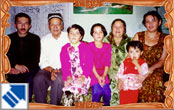



 |
 |
 |
 |
1st January: New YearNew Year is a big event in Uzbekistan although outside the capital it's mainly a family affair rather than a street party. On New Year's Eve most people go from house to house visiting relations and eating an enormous amount of food. Often people won't sleep until sunrise. There are a number of Christmas elements such as Father Snow (rather than Father Christmas) which were incorporated into the secular, Soviet amalgamation of these two festivals.
|
||||||||||||
1st June: Children's DayChildren's Day is a day for celebrating children and childhood. Usually there are lots of things to see in the Old City such as stalls representing various schools and factories, dancers, musicians and the ubiquitous ice-cream sellers.
|
||||||||||||
1st October: Teacher's dayThis is a great day for teachers when they receive gifts of flowers, chocolates and vases from their grateful pupils and students. Other festivals include Ramadan, the Muslim fast of 30 days. Every evening
the fast is broken by drinking water and something sweet, such as dates
or 'neshalla' (a white sticky mixture rather like whisked egg white),
before getting stuck into more substantial food. People often invite their
friends and neighbours for special evening parties during this time. One
of the high points of Ramadan is the 'Night of Power' when Muslims believe
God is especially willing to answer prayers. The final day of the fast
is called 'Rosa Eid' and this includes preparing 'borsok', (deep-fried
diamond pieces of dough) and leaving them at the graves of deceased relatives.
|
||||||||||||
|
||||||||||||